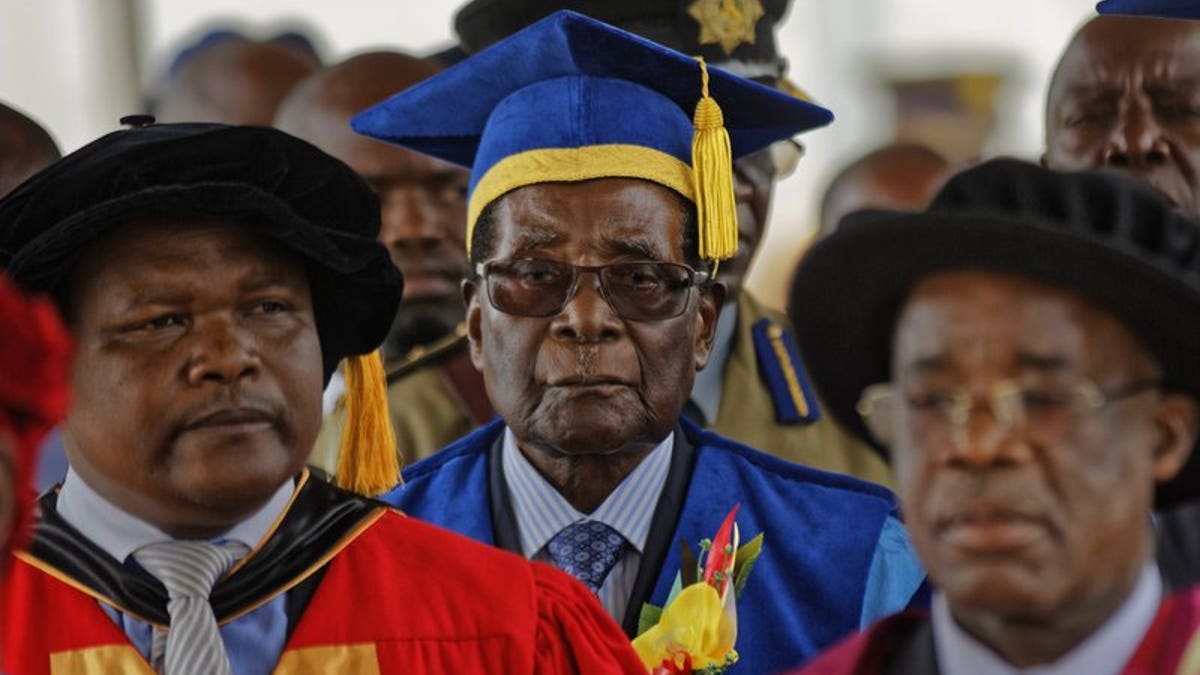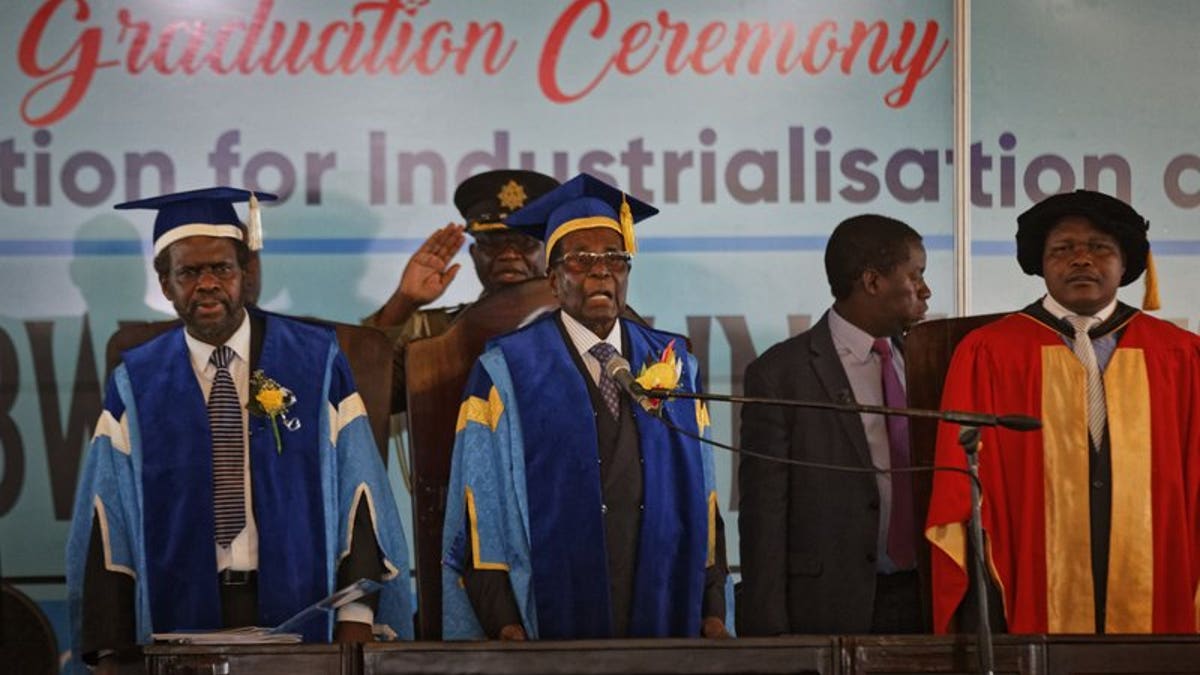
Zimbabwe's President Robert Mugabe, center, arrives to preside over a student graduation ceremony at Zimbambwe Open University, Nov. 17, 2017. (Associated Press)
Zimbabwe’s President Robert Mugabe made his first public appearance since the country’s military took control of the country’s affairs earlier this week and placed him under house arrest.
The 93-year-old Mugabe attended a university graduation ceremony Friday morning and was welcomed with a polite applause. His appearance comes during an extraordinary series of negotiations with regional leaders over his departure after 37 years in power.
There was no sign of first lady Grace Mugabe at Friday's graduation ceremony, which allowed Mugabe to project the image of leadership. Some Zimbabweans worried that Mugabe, the only leader many have ever known, would somehow find a way to stay on.
ZIMBABWE PRES. MUGABE MEETS WITH ARMY COMMANDER FOLLOWING MILITARY TAKEOVER

Zimbabwe's President Robert Mugabe stands for the national anthem during his first public appearance since the military took control of the country, Nov. 17, 2017. (Associated Press)
Mugabe didn't make a speech, merely announcing its opening to applause. Arriving in suit and tie, he put on an academic gown and cap and walked slowly in a red-carpet procession as a marching band played.
The military reportedly announced “significant progress” in talks to remove Mugabe after it arrested some of his key allies. However, it is taking pains to show respect by still referring to him as the president and commander-in-chief.
A statement from the military, as reported by the state-run newspaper, quoted leaders as saying they were “engaging with the Commander-in-Chief President Robert Mugabe on the way forward and will advise the nation of the outcome as soon as possible.”
“Significant progress has been made in their operation to weed out criminals around President Mugabe,” the statement added, noting that the military detained a number of such individuals, while those still at large had been “committing crimes that were causing social and economic suffering in Zimbabwe.”
MUGABE'S 37-YEAR REIGN IN ZIMBABWE APPEARS OVER AFTER MILITARY TAKE CONTROL
However, it seems patience within the ruling ZANU-PF party is thinning as party branches passed no-confidence votes in the provinces of Mashonaland East and Manicaland. Others among the country’s 10 provinces, including Midlands, Masvingo and Harare, were said to follow suit.
Parliament is expected to resume sitting on Tuesday, and it is possible that ZANU-PF could use party procedures to impeach Mugabe with the support of opposition lawmakers.
Former Vice President Emmerson Mnangagwa, whose firing last week led the military to step in, will return to Zimbabwe only after processes to remove Mugabe are complete, high-level supporters told The Associated Press. They spoke on condition of anonymity because they were not authorized to speak to reporters about the matter.
A rally has been called for Saturday in Harare in support of the military's move — another example of the growing freedoms Zimbabweans have been enjoying since Mugabe's house arrest began.
As Mugabe tries to hang on, he has asked for "a few more days, a few more months," the chairman of the influential war veterans' association in Zimbabwe told reporters.
Chris Mutsvangwa, a Mnangagwa ally, said that "between now and tomorrow" they will warn Mugabe that the game is over. "If he doesn't leave, we will settle the scores tomorrow."
Mutsvangwa also said three Cabinet ministers have been arrested in the military's efforts to pursue Mugabe allies. Education minister Jonathan Moyo, local government minister Saviour Kasukuwere and finance minister Ignatious Chombo "are in jail" along with a number of others.
The military is seeking associates of unpopular first lady Grace Mugabe, part of a clique dubbed the G40 because many were in their 40s and 50s. They are of a different generation from the one that fought for independence from white minority rule.
Grace Mugabe's rapid political rise had alarmed many who feared she could replace Mnangagwa and then succeed her husband as president.
Headlines in some local newspapers declared the Mugabe era over. "Dawn of a new era," one said. "Mugabe remembered for brutal 37-year rule," said another.
The ongoing negotiations appear to be trying to get Mugabe to agree to hand over to a new government. But difficulties could include the timing. The ruling party is set to meet next month, and Mugabe's term ends next year. An election date has not been set.
In another striking image of the fluidity of the political situation, state-run media on Thursday published photos of Mugabe jovially shaking hands with army commander Constantino Chiwenga, the general who ordered the president's arrest.
Others pictured in the first round of talks at State House, the president's official residence, include Defense Minister Sydney Sekeramayi, Intelligence Minister Kembo Mohadi, South African Cabinet ministers who are acting as mediators and a local Catholic priest, Fidelis Mukonori, whom Mugabe has used as a mediator before. Grace Mugabe was not pictured.
The Associated Press contributed to this report.
